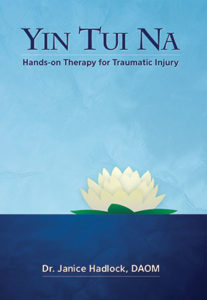 Yin Tui Na: Hands-on therapy for traumatic injury
Yin Tui Na: Hands-on therapy for traumatic injury
Dr. Janice Walton-Hadlock, DAOM, Lac
Raja Books
Published 2018, 198 pages
Yin Tui Na is the Chinese term for light-touch, hands-on medical therapy. This textbook for laymen or students of Chinese medicine explains the theory behind these very simple, elegant techniques. It also explains exactly how much pressure the hands should use, the most comfortable sitting position for the practitioner, and other details for mastering these techniques.
This book includes instruction on Forceless, Spontaneous Release technique (FSR), the technique used by the Parkinson’s Treatment Research Team (1999 to 2013) for treating the unhealed injuries of people with Parkinson’s, as well as an introduction to light-touch craniosacral therapy and other light touch techniques. It also includes Qi Gong techniques that people who have dissociated from injuries can do to accelerate their responses to Yin Tui Na.
The appendices in this book teach how to determine if a person with Parkinson’s has merely dissociated from injuries – usually in childhood – that have eventually set his Parkinson’s in motion, and is therefore a good candidate for Yin Tui Na therapy or if he has created a mental posture – also usually in childhood – that allows him to “rise above” or “be numb to” physical and emotional pain. In the latter case, the person with Parkinson’s will not yet want to receive Yin Tui Na treatment. He will instead want first to read the material in Stuck on Pause, available for free at this website, to turn off this Parkinson’s-creating mindset.
Free PDF edition:
Yin Tui Na:Techniques for Treating Injuries of Parkinson’s Disease or Any Dissociated Injury
To download these books, you must have Adobe Acrobat Reader.
To download Adobe Acrobat Reader, CLICK HERE.
Free PDF edition: Yin Tui Na:Techniques for Treating Injuries of Parkinson’s Disease or Any Dissociated Injury
Click this link to download
Hard copy edition: Purchase Book
In Canada, Hard copy edition is available from Eastern Currents


This is a totally new version of thought to Parkinson’s. I am grateful to be made aware of another background and components of this complex Illness.